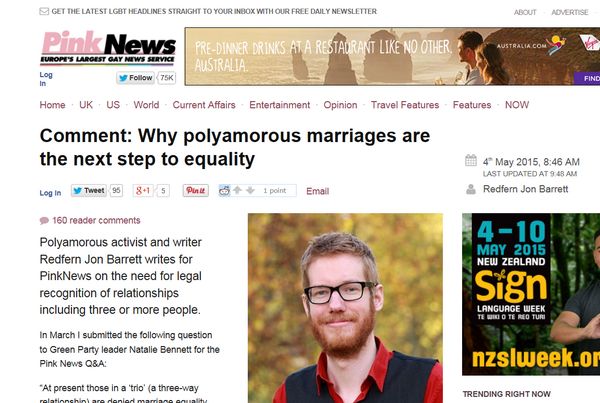Comment: Why polyamorous marriages are the next step to equality
 PinkNews 4 May 2015
PinkNews 4 May 2015
Polyamorous activist and writer Redfern Jon Barrett writes for PinkNews on the need for legal recognition of relationships including three or more people.
In March I submitted the following question to Green Party leader Natalie Bennett for the Pink News Q&A:
“At present those in a ‘trio’ (a three-way relationship) are denied marriage equality, and as a result face a considerable amount of legal discrimination. As someone living with his two boyfriends in a stable long-term relationship, I would like to know what your stance is on polyamory rights. Is there room for Green support on group civil partnerships or marriages?”
Bennett’s response this weekend that she is ‘open’ to discussion on the topic has since made national news, with the BBC, Independent, Buzzfeed, Telegraph, and even the Daily Mail picking up on the story. It has been met by both sympathy and outrage: as I write this a Metro poll shows public support for polyamorous unions to be at 42%, the Mirror at 52%, whereas fundamentalist Christians have (predictably) announced it as a sign of the end times. Regardless of the response, it is the first time the prospect of legal polyamorous unions has been discussed by leading politicians and the mainstream press.
As a polyamorous activist and author, it’s an issue I’m very familiar with, and for me and my family, it’s one which affects many aspects of our lives. Our trio is happy and stable, but lacking basic legal protections the home we have built together could easily come under threat—unconventional families face discrimination in employment, services, and housing. If one of the men I love and have built my life with were to fall ill, I would have no right to visit him in hospital.
At the centre of the issue lies a fundamental inequality: monogamous relationships have legal rights and protections whilst nonmonogamous ones do not. Yet we have the opportunity for a straightforward solution: why not take the now-defunct concept of civil partnerships, and open them to polyamorous households? Each registered family would receive the same partnership rights as any other form of union, and be subject to the same obligations. Most importantly, it would provide legal recognition and protection to the increasing number of alternative households in Britain today.
For many this seems like a radical concept, and perhaps unsurprisingly, many of the arguments against it closely mirror those against same-sex relationships in general: that we’re unnatural, that our relationships are unstable and unhealthy (of course leading to incest and bestiality), even that our love will invoke the wrath of a furious God. Simply replace ‘same-sex’ with ‘polyamorous’, and the whole debate looks painfully familiar.
In fact, LGBT communities have a long history of polyamory—one dating all the way back to Lord Byron and the Shelleys, continuing through to Harvey Milk and the Radical Faeries. A 2006 study showed that 28% of lesbians, a third of bisexuals, and almost two thirds of gay men are open to nonmonogamous relationships. As any polyamorous bond will automatically involve at least two men or two women, all feature some form of same-sex relationship. Polyamorous families are queer families.
At the same time, the arguments in favour of marriage for same-sex couples also apply to trios. Parents should not face losing custody of their children because they’re in a nonmonogamous relationship. Families shouldn’t risk losing their home because inheritance rights favour ‘traditional’ couples. No-one should suffer being barred from their partner’s funeral because their love isn’t recognised.
All loving, adult relationships are valid. As has often been argued during the long struggle for marriage rights, none of us choose whom we fall in love with. Our only choice lies in whether we stand up to discrimination, or ignore it. Gay or straight, lesbian or bi, monogamous or polyamorous, all of us deserve to live and love equally to one another. All of us deserve recognition under the law.
Yes, this will be a battle, but we’ve battled before. Yes, it seems a long way away, but twenty years ago the prospect of two husbands or two wives legally wedding one another seemed equally remote. Each new generation grows more open-minded, tolerant, and accepting than the one before, and I believe that we are sympathetic and capable enough to provide the legal protections polyamorous families need.
Right now we have a historic opportunity to ensure that equality is for all of us. Love is love, regardless of how many share it. A family is a family, whether it has two members or five. In the end, monogamous or not, all LGBT people deserve equal rights—and if the past decades have proved nothing else, it’s that we are very good at fighting for them.






